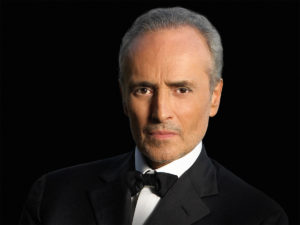
Artist Profile: José Carreras, Legendary Spanish Tenor Who Defied The Odds & Survived Cancer
By David SalazarJosé Carreras is one of the most famous tenors of the 20th century.
Born in Sants on Dec. 5, 1946, the tenor noted in his autobiography that he was obsessed with Mario Lanza in “The Great Caruso” and this amplified his interest in singing. He started voice studies early on and at age eight, he was taking lessons at Barcelona’s Municipal Conservatory. At age 11, he debuted at the Gran Teatre del Liceu in Manuel de Falla’s “El Retablo de Maese Pedro” as the boy soprano.
Even though he continued studying music, he actually entered the University of Barcelona to study chemistry but left after two years to concentrate on his art.
In 1970, he sang in “Norma” at the Liceu as Flavio and captured the attention of soprano Montserrat Caballé. She invited him to sing Gennaro in “Lucrezia Borgia” that December of 1970.
A year later, he made his international debut at the Royal Festival Hall in London in “Maria Stuarda,” also with Caballé. In 1971 he also won the first prize in the Voci Verdiane competition and in 1972 he made his Italian debut as Rodolfo in “La Bohème” at the Teatro Regio di Parma. Swift debuts in New York, San Francisco, Philadelphia, Vienna, and the Royal Opera House in London followed thereafter. He also appeared at the Met Opera and the Teatro alla Scala. By 28, he also had an exclusive contract with Philips.
He had a prominent career through the 1980s, but by the end of the decade, he was diagnosed with acute lymphoblastic leukemia. At the time, his diagnosis gave him a one in 10 chance of survival. His battle took him away from the opera stage, but he gradually returned and overcame the disease. By the 1990s he was back on the opera stage and was also a part of The Three Tenors, a phenomenon that would come to define the next decade of his career.
In addition to his vocal career, Carreras established the José Carreras International Leukemia Foundation. He has been granted the status of Commander of the Ordre des Arts et des Lettres and Chevalier of the Légion d’Honneur.” He has also been decorated by the governments of Italy, Austria, and Spain. He holds 15 honorary doctorates across 11 countries. He also has a plaza and two theaters bearing his name.
Signature Roles
Carreras sang a plethora of repertoire throughout his career, but he is best identified with the operas of Verdi and Puccini. He sang all of the major Puccini operas, but his Rodolfo in “La Bohème” is not only among his most beloved interpretations, but it was also a vehicle for many of his major debuts and performances throughout his career.
He sang many of the major Verdi roles as well, but his relationship to the composer is far more intriguing. Unlike other major tenors of the time, Carreras actually recorded and performed many of the rare early Verdi works, such as “I Due Foscari,” “Un Giorno di Regno,” and “Stiffelio,” among others.
Read more on Carreras
A review of his final performance at Carnegie Hall
Watch and Listen
Here is the tenor in a performance of “La Bohème.”
Categories
Opera Wiki

